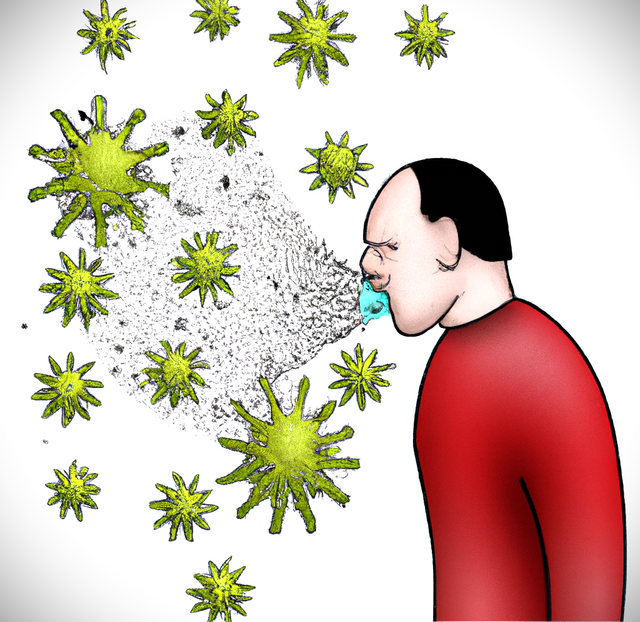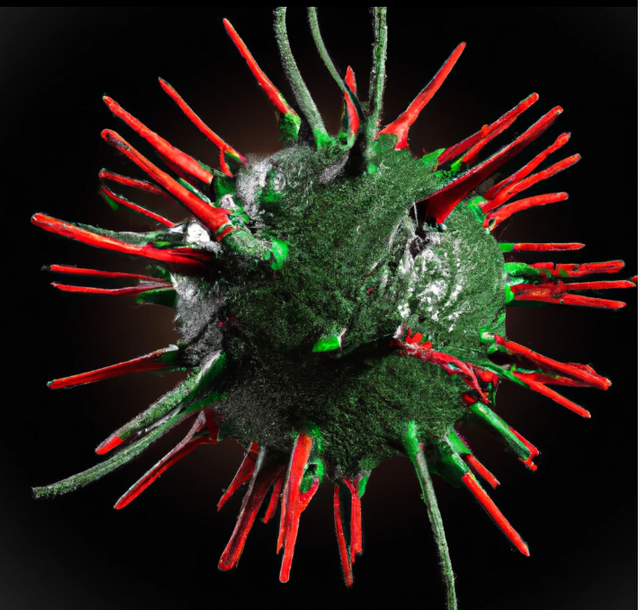The COVID-19 pandemic continues to impact people's health worldwide, causing a range of symptoms, including long-term effects such as persistent organ damage, breathing difficulties, and cognitive dysfunction. Recent studies reveal the prolonged symptoms of COVID-19 and highlight the differences in the immune response to the virus between sexes, indicating potential approaches for preventing and treating long-term COVID-19.

A study published in the Journal of the Royal Society of Medicine showed that organ damage persisted in 59% of patients a year after the initial symptoms of COVID-19, including those not severely affected. The study emphasized the need for larger cohorts to explore the underlying mechanisms of long COVID.
Another study by Osaka University found sex-specific differences in the immune response to COVID-19, showing that male patients lose Tfr cells more quickly, while females have more circulating Tfr cells and lower antibody levels. These findings could be critical in protecting individuals from COVID-19 infection.
A survey of 825 adults who received COVID-19 treatment at medical centers in the United States between August 2020 and July 2021 revealed that after six months, more than 7 in 10 adults experienced cardiopulmonary problems, and about half had fatigue or physical limitations, suggesting that many people hospitalized for COVID-19 should expect symptoms to last for up to six months or even longer.
Skoltech researchers also found mutations enabling T cell escape that emerged in a patient with compromised immunity, making it a potential global threat as strains resistant to T cell-based immunity could emerge that way. The study recommended further investigation to understand the potential dangers of such potential mutant strains.
Moreover, an associate professor of allergy and clinical immunology at the University of Colorado School of Medicine suggests that long COVID may be due to viral reservoirs that linger in the body, causing the immune system to become overactive in its efforts to eradicate them. The study suggests that an antiviral medication such as Paxlovid could be an effective treatment for long COVID.

Furthermore, a decline in routine vaccinations for kindergarten children in the US for the second year in a row, leaving about 250,000 kindergarten children in the US vulnerable to measles infections. Pediatric infectious diseases physician Dr. Nipunie Rajapakse recommends talking to a child's healthcare professional for reliable information about vaccinations and recommends evidence-based information websites such as mayoclinic.org and the CDC. COVID misinformation is blamed for the decline of COVID and other vaccinations in children.
On a positive note, a team of researchers created an innovative anti-COVID mucosal vaccine that can prevent even moderate forms of the disease and block inter-individual transmission to achieve sterilizing immunity. This nasal vaccine induces both systemic and local immune responses, directly at the gate of the entry of SARS-CoV-2, and is composed of an original fusion protein made of the Spike protein associated with the nucleoprotein of the virus.
In conclusion, the studies provide insights into the prolonged symptoms of COVID-19 and potential treatments, emphasizing the need for larger cohorts to investigate the underlying mechanisms. Meanwhile, the decline in routine vaccinations underlines the importance of continuing vaccination efforts to protect against other preventable infections. Finally, the innovative vaccine offers a promising solution to block the inter-individual transmission of the virus.

Works Cited:
A new study published in the Journal of the Royal Society of Medicine has found that organ damage in long COVID patients persisted in 59% of patients a year after initial symptoms, even in those not severely affected when first diagnosed with the virus. The study focused on patients reporting extreme breathlessness, cognitive dysfunction, and poor health-related quality of life. 536 long COVID patients were included in the study, and 62% of patients were identified with organ impairment six months after their initial diagnosis. The findings confirmed that 29% of patients with long COVID had multi-organ impairment, with persistent symptoms and reduced function at six and twelve months. The study reported a reduction in symptoms between six and 12 months. The underlying mechanisms of long COVID remain elusive, and future research must consider associations between symptoms, multi-organ impairment, and function in larger cohorts.
https://medicalxpress.com/news/2023-02-patients-covid-year-symptoms.html
A research group from Osaka University has identified sex-specific differences in the immune response to COVID-19, revealing changes to regulatory T cells (Treg cells) and the production of antibodies. Tfr cells, a subset of Treg cells responsible for controlling antibody production, were found to be lost more quickly in male patients, while females had more circulating Tfr cells and lower antibody levels. The study also revealed changes in the ratio between circulating Tfr cells and other cells associated with antibody production. This cellular basis for sex-specific differences in the immune response could be vital in protecting individuals from COVID-19 infection.
https://medicalxpress.com/news/2023-02-men-higher-covid-.html
A study published in JAMA Network Open found that about half of adults treated at hospitals for COVID-19 have experienced lingering symptoms, financial difficulties, or physical limitations months after being discharged. The study, which surveyed 825 adults who received treatment for COVID at 44 medical centers in the United States between August 2020 and July 2021, found that after six months, more than 7 in 10 adults experienced cardiopulmonary problems, such as coughing, rapid or irregular heartbeat, and breathlessness, while about half had fatigue or physical limitations. Additionally, more than half of the adults surveyed faced financial challenges. These findings suggest that many people hospitalized for COVID-19 should expect symptoms to last for up to six months or even longer.
https://medicalxpress.com/news/2023-02-lingering-symptoms-common-covid-hospitalization.html
Scientists have long been studying the coronavirus and how it fights antibodies and T cells in the immune system. While mutations allowing the virus to evade antibodies have been on the scientists' radar, T cell evasion has been poorly understood. However, a recent study by Skoltech researchers and their colleagues found mutations enabling T cell escape that emerged in a patient with compromised immunity. These mutations allowed the virus to prevent the patient's T cells from recognizing it, making it a new source of dangerous mutant strains. The researchers also found that such adaptations could be a potential global threat as strains resistant to T cell-based immunity could emerge that way. Further investigations are being carried out to understand the potential dangers of such potential mutant strains.
https://medicalxpress.com/news/2023-02-route-dangerous-coronavirus-strain-emergence.html
Long COVID, a condition where the symptoms of COVID-19 persist for months or years after the initial infection, is estimated to affect one in every five COVID-19 patients. According to Brent Palmer, an associate professor of allergy and clinical immunology at the University of Colorado School of Medicine, long COVID may be due to viral reservoirs that linger in the body, causing the immune system to become overactive in its efforts to eradicate them. A study conducted by Palmer and his team shows a strong connection between these T cells and long COVID. The study suggests that an antiviral medication such as Paxlovid could be an effective treatment for long COVID.
https://medicalxpress.com/news/2023-02-potential-covid.html

The Centers for Disease Control and Prevention (CDC) reports that routine vaccinations for kindergarten in the US fell to 93% during the 2021-2022 school year, the second year in a row of decreased vaccination rates. The CDC cites several reasons for the decline, including potential misinformation about vaccines, which can be confusing for parents. Dr. Nipunie Rajapakse, a pediatric infectious diseases physician, recommends talking to a child's healthcare professional for reliable information about vaccinations and recommends websites such as mayoclinic.org and the CDC for evidence-based information. The decline in measles, mumps, and rubella (MMR) vaccinations leaves about 250,000 kindergarten children in the US vulnerable to measles infections. The CDC recommends all children receive two doses of the MMR vaccine, starting with the first dose at 12-15 months old and the second dose at ages 4-6. Whooping cough is another concern, and outbreaks of these vaccine-preventable infections can occur in communities. Adult vaccination can protect against several diseases as well.
https://medicalxpress.com/news/2023-02-child-routine-vaccinations.html
A team of researchers at the Joint University-INRAE ISP 1282 research unit has created an innovative anti-COVID mucosal vaccine that can prevent even moderate forms of the disease and block inter-individual transmission to achieve sterilizing immunity. This nasal vaccine induces both systemic and local immune responses, directly at the gate of the entry of SARS-CoV-2, and is composed of an original fusion protein made of the Spike protein associated with the nucleoprotein of the virus. The vaccine is wrapped in nano-carriers that are sugar polymeric molecules, and the delivery system is a spray, which can effectively deposit the vaccine in the nasal cavity at the level of the areas containing the mucosal immune cells. The team's nasal vaccine approach is still under development and differs from other mucosal vaccine candidates currently available.
https://medicalxpress.com/news/2023-02-advantages-anti-covid-nasal-vaccination-french.html
A new class of lab-made monoclonal antibodies has been discovered that can neutralize multiple variants of SARS-CoV-2, the virus that causes COVID-19, according to a study from the Garvan Institute of Medical Research. The class 6 antibodies attach to a partially hidden part of the virus spike protein that is difficult for the virus to mutate, providing hope for a more effective antiviral medication for at-risk individuals. Unlike the five previously known classes of SARS-CoV-2 antibodies, which have limited effectiveness with new variants, these new antibodies have shown effectiveness against delta and omicron variants. The discovery may also lead to fast-tracking antibody therapies for other viral illnesses.
https://medicalxpress.com/news/2023-02-class-antibodies-covid-.html
A new study by investigators at the Smidt Heart Institute at Cedars-Sinai has confirmed that people who have had COVID-19 are at an increased risk of developing new-onset diabetes, which is the most significant contributor to cardiovascular disease. The study evaluated medical records from over 23,000 adult patients who had at least one documented COVID-19 infection and were treated within the Cedars-Sinai Health System in Los Angeles from 2020-2022. The research showed that the risk of type 2 diabetes after COVID-19 exposure was 2.1%, with 70% occurring after COVID-19 infection. The risk of type 2 diabetes after COVID-19 exposure for unvaccinated patients was higher than vaccinated patients. The findings suggest that COVID-19 vaccination prior to infection may provide a protective effect against diabetes risk. This research broadens the medical field's understanding of the effects of COVID-19 on the body, while simultaneously raising yet-to-be-answered questions. The goal of this research is to find ways to keep people healthy and able to engage in their everyday activities and lives.
https://medicalxpress.com/news/2023-02-covid-infection-diabetes.html
A study published in Radiology found that 39% of patients who recovered from COVID-19 had persistent lung abnormalities, including fibrosis, two years after their infection. The study, which is the first to report two-year follow-up data on COVID-19 lung effects, also found a correlation between the residual lung abnormalities and changes in lung function. Patients with lung abnormalities were more likely to experience respiratory symptoms and abnormal lung function. The researchers suggest that persisting symptoms and abnormal lung function could be related to ongoing lung damage. They recommend that patients with residual lung abnormalities or respiratory symptoms after COVID-19 should be followed up to detect and manage pulmonary changes and functional impairment.
https://medicalxpress.com/news/2023-02-chest-ct-lung-abnormalities-years.html
The German Corona-Warning-App (CWA) was introduced to help break chains of COVID-19 infection by facilitating contact tracing of infected individuals. However, the app's initial slow adoption suggested that privacy concerns outweighed the benefits of helping others for individual users. To understand how to promote the use of the app, researchers examined the moral perspectives of individual users. They found that moral intensity, derived from the magnitude of consequences, social norms about app use, individual proximity to COVID-19 cases, and the probability of the app's positive effect, strongly influenced app downloads. Further, manipulating moral intensity among non-users led to a higher number of downloads in a follow-up study. The study highlights ways to increase adoption of contact tracing apps and other apps for the common good.
https://www.sciencedirect.com/science/article/pii/S074756322300050X
This study aimed to evaluate immunological markers in the serum samples of COVID-19 convalescent patients and investigate their association with age and sex. The results revealed significantly elevated levels of the serum immunological signatures in the convalescent group compared to the control group, with age showing an association with elevated levels. The study suggests that COVID-19 infection results in a persistent inflammatory response, leading to prolonged post-recovery symptoms, and highlights the need for further research to clarify its pathophysiology, pathogenesis, and long-term implications.
https://www.sciencedirect.com/science/article/pii/S0171298523000165
This article discusses the importance of well-trained T-cell immunity for early viral containment, especially with the help of an ideal vaccine. While most COVID-19 convalescent cases recover with the generation of virus-specific memory T-cells, some cases have encountered T-cell abnormalities, and mutant strains threaten the effectiveness of the first-generation vaccines. Next-generation vaccines aim to educate T-cell memory for efficient viral containment by triggering a broad and fast response targeting several viral proteins. The article discusses several interesting vaccine approaches to effectively employ T-cell memory and highlights some essential facts and possible future consequences of using current vaccines. The long-term consequences of frequent administration of nasal boosters must be investigated carefully. The article emphasizes the need to analyze vaccine-induced molecular and immunological changes, especially in T-cell immunity.